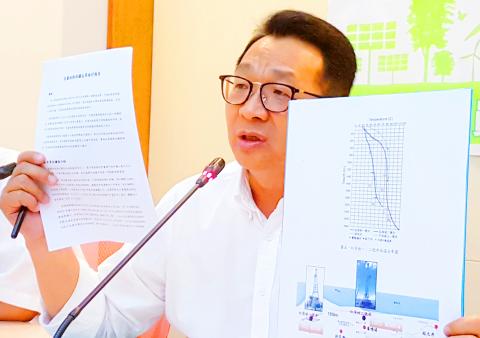The government should include geothermal energy development in the Forward-looking Infrastructure Development Program budget because resuming construction of the Fourth Nuclear Power Plant is not the way to address the nation’s electricity shortage, Democratic Progressive Party (DPP) Legislator Chen Ou-po (陳歐珀) said yesterday.
“We should use the next eight years to develop ‘green’ energy, which should be the only option,” he said.
President Tsai Ing-wen (蔡英文) has vowed to make Taiwan free of nuclear power plants by 2025 and make Yilan County’s geothermal energy plant operational by 2020, he said.

Photo: Chu Pei-hsiung, Taipei Times
Ministry of Economic Affairs officials told the 2015 National Energy Conference that the nation’s geothermal energy reserve is equivalent to 11.8 times the total electricity that could be generated by the Fourth Nuclear Power Plant, the lawmaker said.
A study by the National Science Council conducted in 2010 and 2011 found that the geothermal energy reserve in Yilan County — particularly from Cingshuei (清水) to Touchang (土場), Longde (龍德) to Lize (利澤) and Sansing (三星) and Jiaosi (礁溪) townships — can generate as much electricity as two-and-a-half nuclear power plants, Chen said.
Geothermal energy would be a safe energy source and help reduce the nation’s carbon emissions, he added.
However, the “green” energy projects listed in the infrastructure program do not include geothermal ones, he said.
Yilan County began developing geothermal energy in Cingshuei 30 years ago, he said, adding that Taiwan would have become a nation known for its geothermal energy industry if the government at the time had invested in geothermal power plants rather than nuclear energy, he said.
The Philippines has seven geothermal fields and 18 geothermal power plants, and is the world’s second-largest producer of such energy, while 15 percent of its power supply comes from geothermal power plants, he said.
“Taiwan and the Philippines are both on the Ring of Fire in the Pacific Ocean, in which earthquakes and volcanic eruptions happen frequently,” Chen said.
“Taiwan has not generated any geothermal energy and has trailed behind the Philippines in this regard for 30 years,” he said.
The government should increase its investment in geothermal energy because technological advances have given the field a good chance of success, he said.
It has already taken the first step by signing a contract with the Cingshuei Geothermal Power Plant to reactivate production there and the plant plans to expand production to 4 megawatts in four years, which could supply electricity to 28,000 households, Chen said.
Although the Ministry of Technology plans to spend NT$400 million (US$13.2 million) on a two-year project to drill excavation wells in Sansing Township, Chen said that only NT$198 million has been approved.
It needs to provide the rest of the funds quickly to facilitate the excavation efforts, he said.

‘DENIAL DEFENSE’: The US would increase its military presence with uncrewed ships, and submarines, while boosting defense in the Indo-Pacific, a Pete Hegseth memo said The US is reorienting its military strategy to focus primarily on deterring a potential Chinese invasion of Taiwan, a memo signed by US Secretary of Defense Pete Hegseth showed. The memo also called on Taiwan to increase its defense spending. The document, known as the “Interim National Defense Strategic Guidance,” was distributed this month and detailed the national defense plans of US President Donald Trump’s administration, an article in the Washington Post said on Saturday. It outlines how the US can prepare for a potential war with China and defend itself from threats in the “near abroad,” including Greenland and the Panama

A wild live dugong was found in Taiwan for the first time in 88 years, after it was accidentally caught by a fisher’s net on Tuesday in Yilan County’s Fenniaolin (粉鳥林). This is the first sighting of the species in Taiwan since 1937, having already been considered “extinct” in the country and considered as “vulnerable” by the International Union for Conservation of Nature. A fisher surnamed Chen (陳) went to Fenniaolin to collect the fish in his netting, but instead caught a 3m long, 500kg dugong. The fisher released the animal back into the wild, not realizing it was an endangered species at

The Chinese Nationalist Party (KMT) is maintaining close ties with Beijing, the Democratic Progressive Party (DPP) said yesterday, hours after a new round of Chinese military drills in the Taiwan Strait began. Political parties in a democracy have a responsibility to be loyal to the nation and defend its sovereignty, DPP spokesman Justin Wu (吳崢) told a news conference in Taipei. His comments came hours after Beijing announced via Chinese state media that the Chinese People’s Liberation Army’s Eastern Theater Command was holding large-scale drills simulating a multi-pronged attack on Taiwan. Contrary to the KMT’s claims that it is staunchly anti-communist, KMT Deputy

The High Prosecutors’ Office yesterday withdrew an appeal against the acquittal of a former bank manager 22 years after his death, marking Taiwan’s first instance of prosecutors rendering posthumous justice to a wrongfully convicted defendant. Chu Ching-en (諸慶恩) — formerly a manager at the Taipei branch of BNP Paribas — was in 1999 accused by Weng Mao-chung (翁茂鍾), then-president of Chia Her Industrial Co, of forging a request for a fixed deposit of US$10 million by I-Hwa Industrial Co, a subsidiary of Chia Her, which was used as collateral. Chu was ruled not guilty in the first trial, but was found guilty